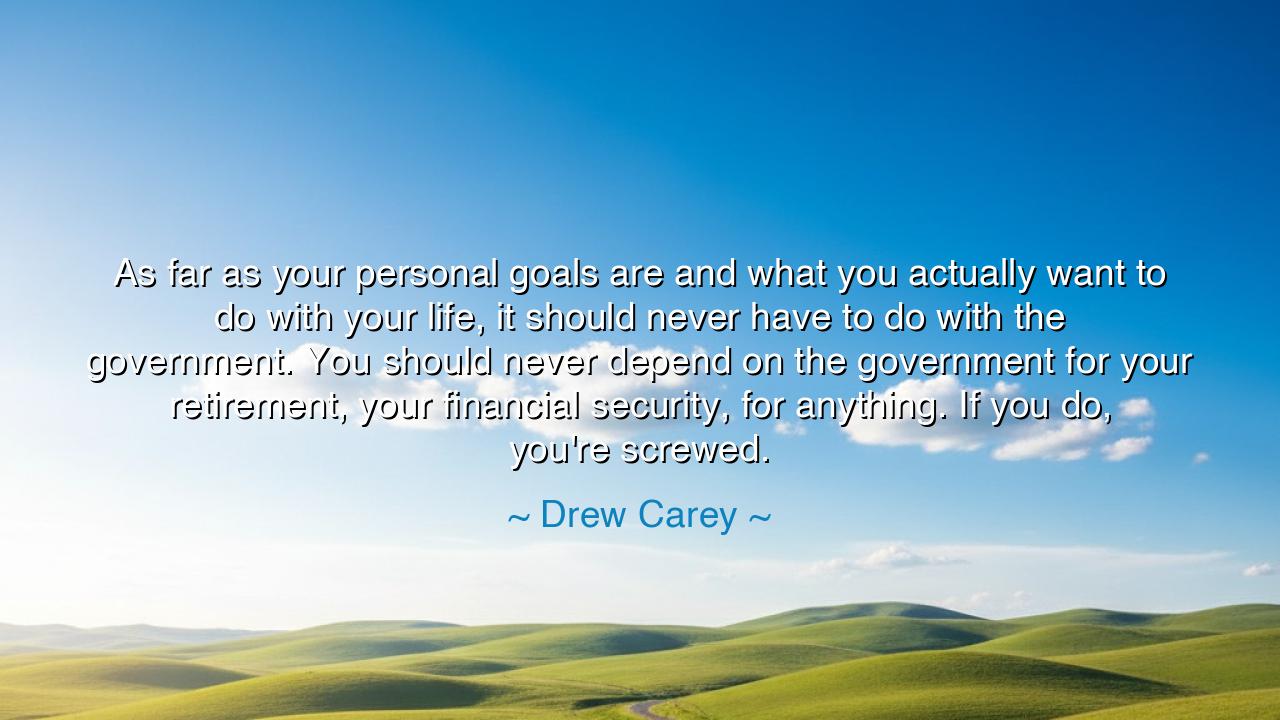
As far as your personal goals are and what you actually want to
As far as your personal goals are and what you actually want to do with your life, it should never have to do with the government. You should never depend on the government for your retirement, your financial security, for anything. If you do, you're screwed.






In an age when the state looms large over the lives of men, when comfort and safety are often sought in the hands of distant powers, the comedian and thinker Drew Carey spoke words that, though clothed in humor, carry the gravity of timeless truth: “As far as your personal goals are and what you actually want to do with your life, it should never have to do with the government. You should never depend on the government for your retirement, your financial security, for anything. If you do, you're screwed.” Beneath the laughter of his profession, Carey’s words echo the fierce independence of the ancients — the belief that a man’s destiny must be his own, not dictated by rulers nor sustained by institutions. His message is not cynicism; it is a call to courage — a reminder that freedom begins with self-reliance.
The origin of this quote lies in Carey’s reflections on personal responsibility and the role of the individual in society. Long before he was known for his success in comedy and television, Carey knew the sting of struggle — of working odd jobs, of being broke, of building something from nothing. His words come not from theory, but from life. In his time, as in ours, people increasingly looked to government programs as the foundation of their future — pensions, healthcare, welfare, and retirement security. Carey, shaped by his own trials and triumphs, saw the danger in this dependence. Governments, he warned, are not eternal, nor are they perfect. To entrust one’s dreams and survival to their promises is to build a house upon sand.
This warning has ancient roots. The philosophers and statesmen of old understood that liberty and self-sufficiency are intertwined. In the rugged republics of Greece and Rome, citizens were taught that their dignity came from their ability to stand on their own — to labor, to save, to fight, and to think independently. When Rome grew wealthy, her people began to rely on state distributions of grain and entertainment — the infamous “bread and circuses.” In time, the virtues that had built the Republic decayed, replaced by dependence and apathy. The people who had once ruled themselves became subjects once more. The lesson was clear: a people who forget how to sustain themselves invite the return of masters.
Carey’s warning is not a rejection of government’s role in justice or protection, but of personal surrender. To depend entirely on a system is to lose the fire of initiative, the strength of endurance, and the dignity of ownership over one’s life. For when governments falter — and all governments do — those who have not learned to provide for themselves are left adrift. History has shown this cruel truth in times of crisis. When the Soviet Union collapsed, millions who had lived their lives under the promise of state security found themselves destitute overnight. Factories closed, pensions vanished, and the people, once promised a cradle-to-grave guarantee, were forced to rediscover what it meant to survive by their own hand. The collapse did not destroy only an economy; it revealed the weakness of dependence.
In contrast, those who cultivate self-reliance — in skill, in savings, in spirit — possess a strength no government can grant or take away. Such people are not the playthings of circumstance. They weather hardship with resilience and success with humility. Carey’s words remind us that the greatest wealth a person can own is not gold or pension, but the capacity to act, to create, to endure. A free man may lose his possessions, but he cannot lose his will; a dependent man may have comforts, but he has no power over his fate. To seek safety in government, Carey warns, is to exchange liberty for illusion — a poor bargain indeed.
And yet, his message carries not despair but empowerment. It is a challenge to every listener: to live intentionally, to take ownership of one’s destiny, to build a life not by the permission of rulers but by the strength of one’s own vision. The ancient Stoics taught this same creed — that control begins within. You may not rule the world, but you can rule yourself. When citizens live by this creed, nations thrive; when they abandon it, even the strongest republics decay. Government may serve as a guardian, but never as a parent. It may build roads and defend borders, but it cannot give meaning to your life.
The lesson, therefore, is clear and eternal: do not depend on what can fail. Build your foundation upon what endures — your character, your labor, your knowledge, your faith. Let your savings be your shield, your skill your sword, your conscience your compass. Governments rise and fall, economies boom and break, but the soul of a self-reliant person remains steadfast. Seek security not in systems, but in self-mastery.
So let Drew Carey’s words resound not merely as jest, but as modern wisdom clothed in laughter: “You should never depend on the government for your retirement, your financial security, for anything.” It is not cynicism, but courage; not defiance, but discipline. For when men and women cease to look upward for permission and inward for strength, they rediscover the oldest secret of freedom — that destiny belongs not to the powerful, but to those who take responsibility for their own lives.






AAdministratorAdministrator
Welcome, honored guests. Please leave a comment, we will respond soon